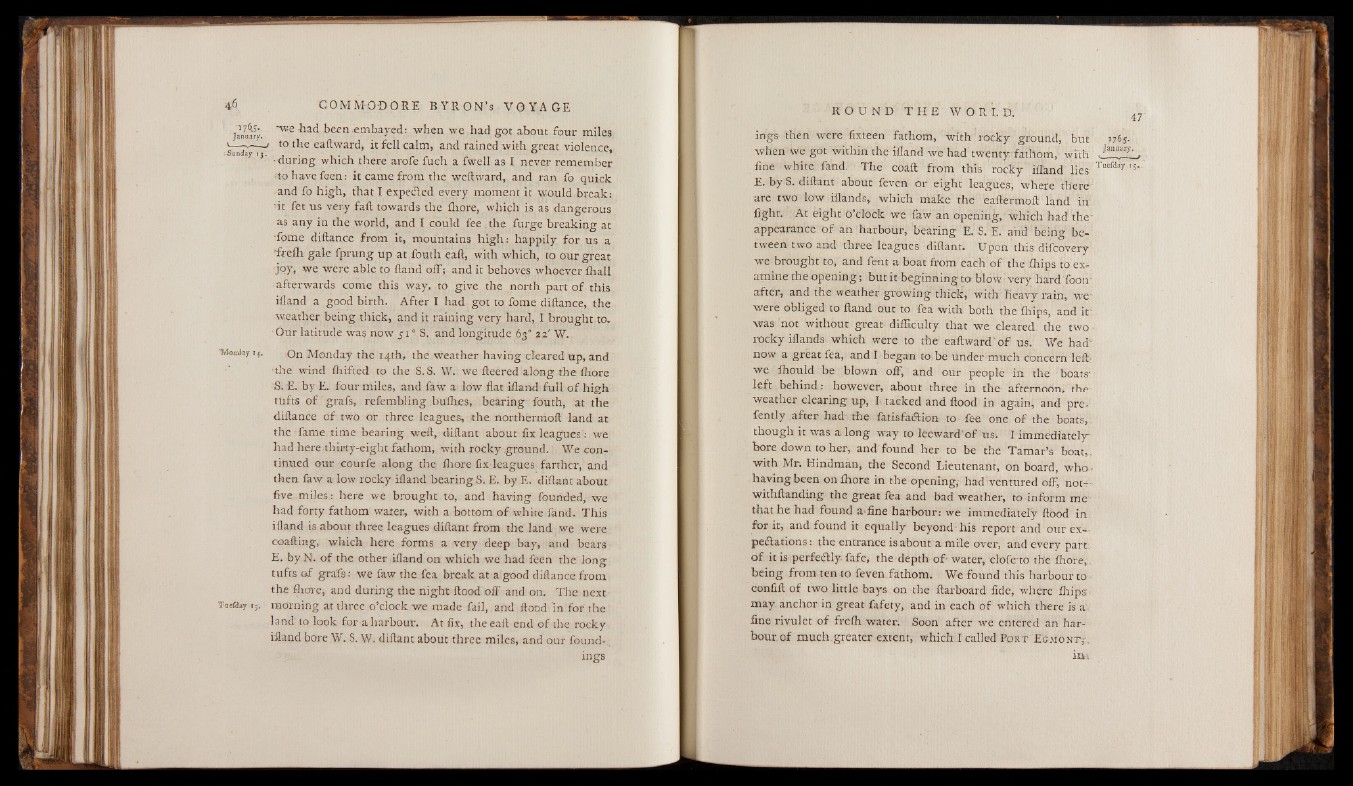
Janua?y ~we liad been -embayed: when we had got about four miles
j---- -----» to the eaftward, it fell calm, and rained with great violence.
-Sunday 11. . . . . - ° *
■ aurmg which there arofe inch a fwell as I never remember
tohavefeen: it came from the weft ward, and ran fo quick
and fo high, that I expected every moment it would break:
it fet us very fall towards the Chore, which is as dangerous
as any in the world, and I could fee«the furge breaking at
dome diftance from it, mountains high: happily for us a
frelh gale fprung up at fouth eaft, with which, to our great
joy, we were able to ftand off; and it behoves whoever lhall
afterwards come this way, to give the north part o f this
ifland a good birth. After I had got to fome diftance, the
weather being thick, and it raining very hard, I brought to.
Our latitude was now 5 10 S. and longitude 63° 22' W.
•Monday 14. On Monday the 14th, the weather having cleared up, and
the wind fhifted to the S. S. W. we fleered along the Ihore
S. ■ £. by E. four miles, and faw a low flat ifland full of high
tufts o f grafs, refembling bullies, bearing fouth, at the
diftance o f two or three leagues, the northermoft land at
the fame time bearing weft, diftant about fix leagues : we
had here thirty-eight fathom, with rocky ground. We continued
our courfe along the fliore fix leagues farther, and
then faw a low rocky ifland bearing S. E. by E. diftant about
five miles.: here we brought to, and having founded, we
had forty fathom water, with a bottom of white fand. This
ifland is about three leagues diftant from the land we were
coafting, which here forms a very deep bay, and bears
E. by N. o f the other ifland on which we had feén the long
tufts of grafs: we faw the fea break at a good diftance from
the fliare, and during the night flood off and on. The next
ïWday-fj, morning at three o’clock we made fail, and flood In for the
land to look for a harbour. At fix, the eaft end of the rocky
ifland bore W. S. W, diftant about three miles, and our found-.
ings
ings then were fixteen fathom, with rocky ground, but 1765.
when we got within the ifland we had twenty fathom, with .
fine white fand. The coaft from this rocky ifland lies Tuefday ‘s-
E. by-S. diftant about feven or eight leagues, where there"
are two low iflands, which make the eaftermoft land in
fight. At eight O’clock we faw an opening, which had the
appearance o f an harbour, bearing E. S. E. and being between
two and three leagues diftant. Upon this difcovery
we brought to, and fent a boat from each o f the Ihips to examine
the opening ; but it beginning to blow very hard foon-
after, and the weather growing thick, with heavy rain, we-
were obliged to ftand out to fea with both the ftiips, and i r
was not without great'difficulty, that we cleared the two
rocky iflands which were to the eaftward’ o f us. We had"
now a great fea, and I began to be under much concern left-
we fhould be blown oft*, and our people in the boats
left behind: however, about three in the- afternoon, the-
weather clearing up, I tacked and flood in again, and pre-
fiently after had the fatisfadtion to- fee one o f the boats,,
though it was a long way to leeward'of us. I immediately
bore down to her, and found her to be the Tamar’s boat,,
with Mr. Hindman, the Second Lieutenant, on board, who.
having been on £hore in the opening,- had ventured off, not--
withftanding the great fea and bad weather, to inform me
that he had found a-fine harbour: we immediately flood in;
for it, and found it equally beyond-his report and our expectations:
foe entrance is about a mile over, and every part,
o f it is perfectly fafe, the depth of-water, clofe to the ihore,.
being from ten to feven fathom. We found this harbour to
confift o f two little bays on the ftarboard fide, where ftiips.
may anchor in great fafety, and in each of which there is affine
rivulet of frelh water. Soon after we entered an harbour
of much greater extent, which I called Port Egmontt.
in;